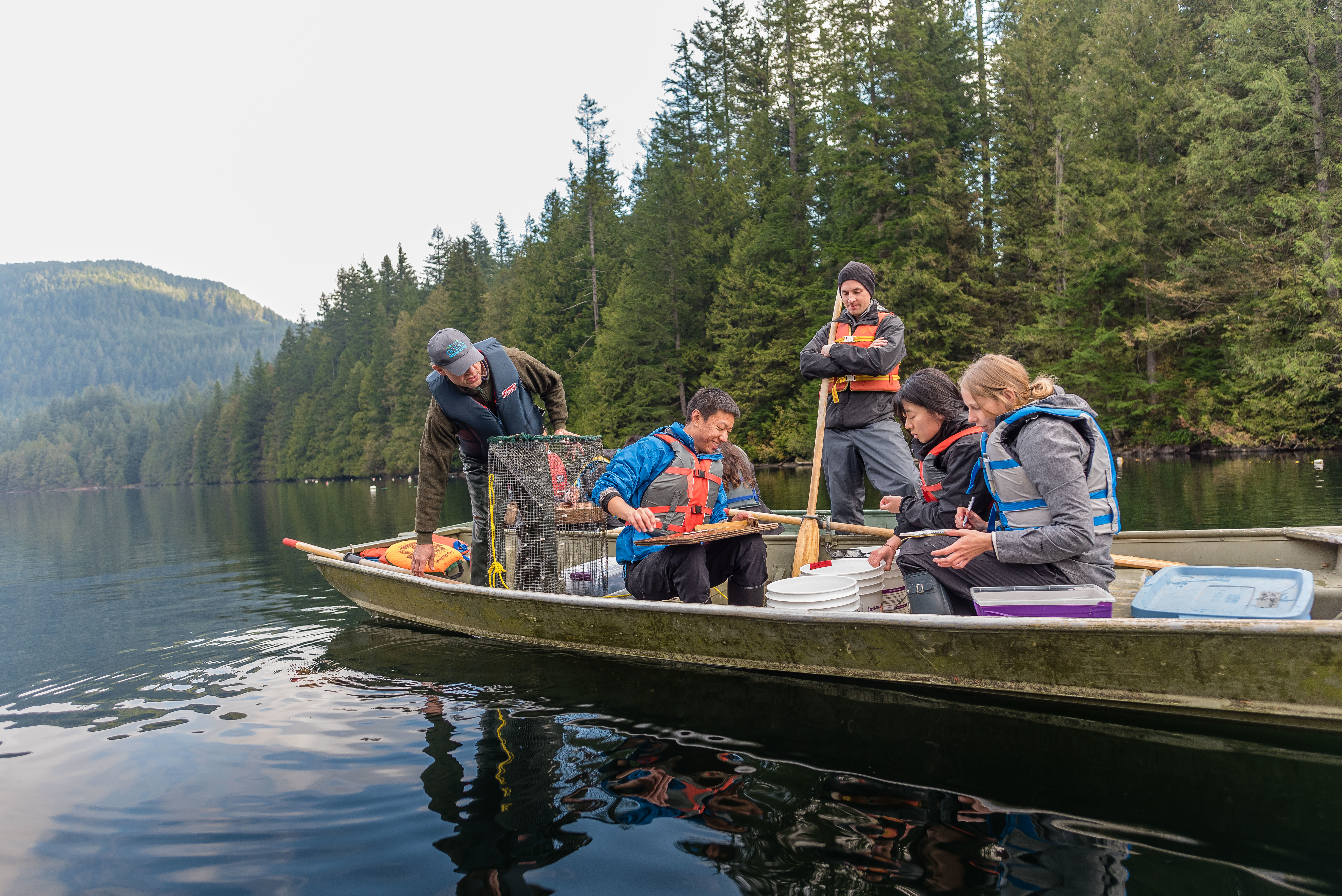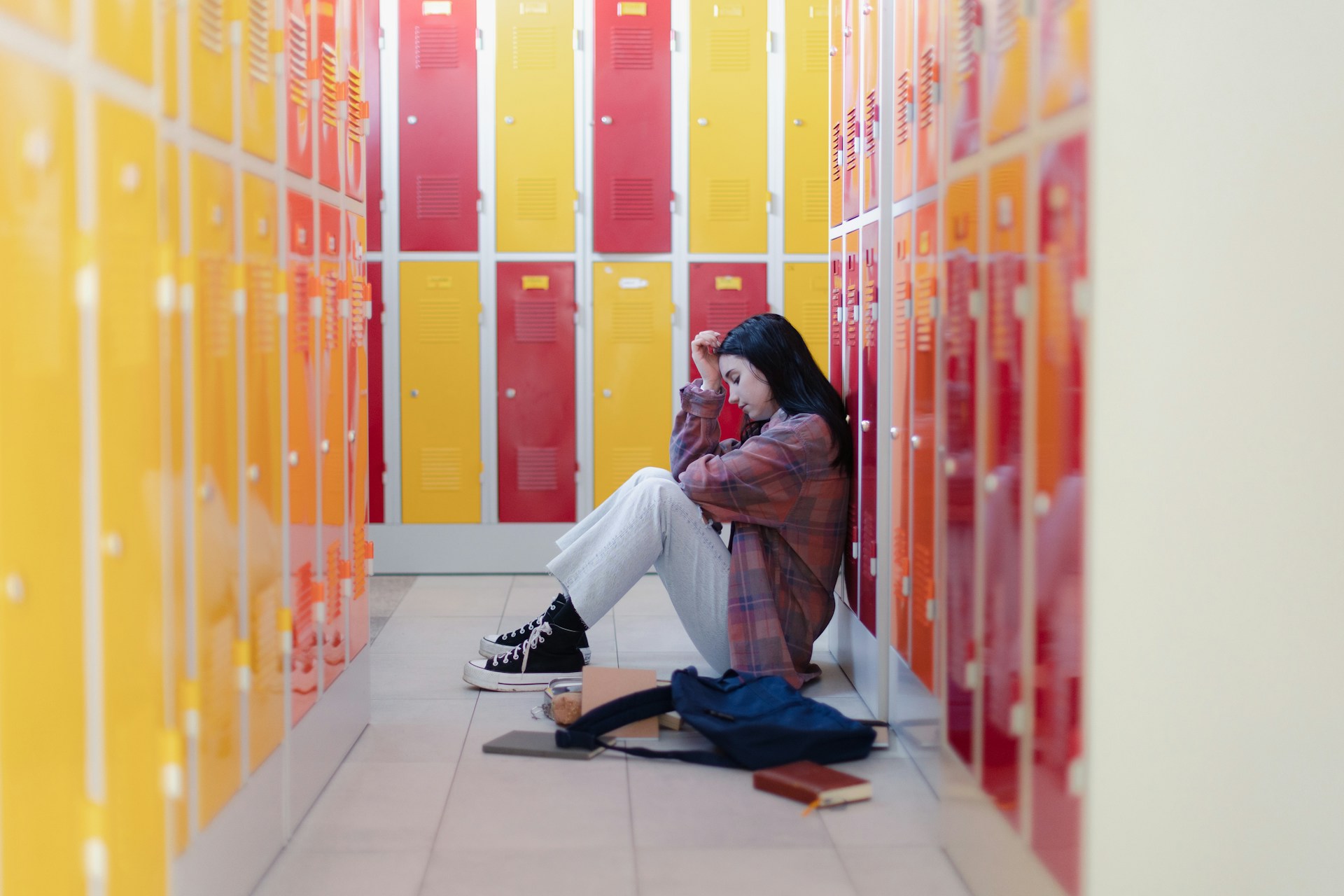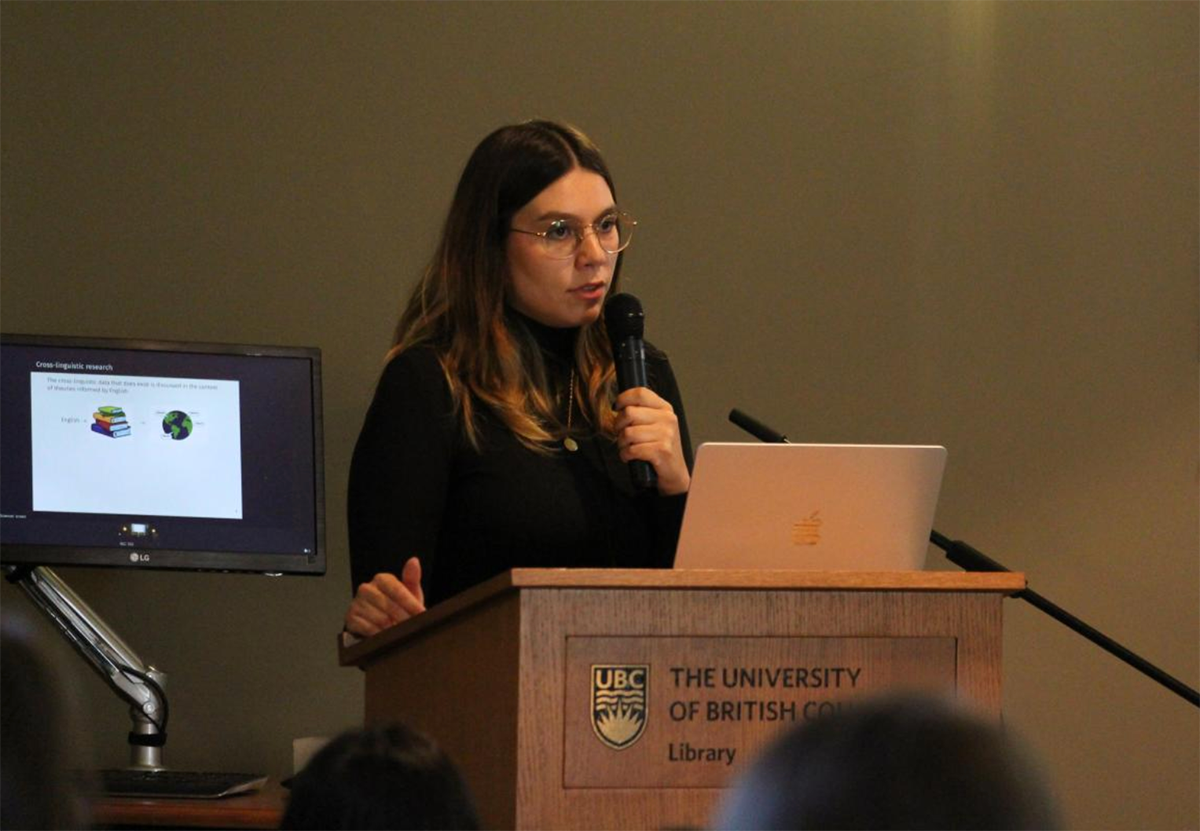

Six community-university projects from the Faculty of Arts have been funded by the 2021-22 Community-University Engagement Support Fund (CUES).
This year’s projects tackle climate justice, community-based storytelling, Indigenous language revitalization, and more.
The CUES Fund supports partnerships that benefit communities and advance collaborative research, teaching, and learning across the province. Paid directly to community partners, CUES funding reduces financial barriers and prioritizes reciprocal, inclusive engagement so all communities — especially those that have been and continue to be underserved, marginalized, or excluded — can benefit.
“Building strong relationships between UBC researchers and community partners is an important way to co-develop appropriate responses and approaches to identified needs across our province,” said Dr. Matthew Evenden, Associate Vice-President, Research and Innovation.
Learn more about the funded projects below.
Nun ke’ Daahwéhsats (Dancing with the Land)
- Community partner: Tamara Dokkie, West Moberly First Nations
- UBC Arts partner: Dr. Jessica Dempsey, Department of Geography
Dunne-za (Beaver people), the ancestors of West Moberly First Nations (WMFN), have successfully navigated climatic and ecosystem changes for the past 15,000 years. Colonial systems have significantly increased the pace and scale of change over the past few hundred years; WMFN is now confronted with rapid, human-driven climate change that may result in further losses to their Indigenous way of life.
‘Dancing with the Land’ is a partnership between the WMFN and UBC Geography professor Jessica Dempsey. For there to be dance in WMFN culture, the land calls the people together to develop and renew relations and connections. Their dances represent the union of diverse and unique visions, feelings, understandings, and aspirations in a way that is socially meaningful and consequential.
The purpose of Dancing with the Land is to advance meaningful and consequential relationship-building, knowledge exchange and research planning around climate change impacts and policies.
Partners will host a 2.5-day workshop and develop a cooperative climate research agenda (CCRA) identifying immediate needs, knowledge gaps, priorities, and funding opportunities for the partners.
Housing justice in a climate emergency: Building a research and advocacy partnership for intersecting tenant vulnerabilities to extreme weather
- Community partner: Andrew Sakamoto, Tenant Resource & Advisory Centre
- UBC Arts partner: Dr. Mohammed Rafi Arefin, Department of Geography
In the past year, climate change has complicated the fight for affordable and secure housing in British Columbia. The 2021 heat dome was responsible for the deaths of 595 people making it the deadliest weather event in Canadian history. Almost all of these deaths occurred at home or in a hotel and disproportionately impacted the elderly, disabled, and poor, many of them tenants living without proper ventilation or cooling.
Such inequality is occurring in a province that is already home to the eviction capital of Canada: Metro Vancouver. In the now intersecting housing and climate emergency, marginalized BC tenants exposed to extreme weather face unique vulnerabilities. Current adaptation measures could result in increased rents and “reno-victions.”
Housing advocates currently lack the data to push for equitable climate-focused changes to tenant protections. UBC’s Centre for Climate Justice (CCJ) and BC’s Tenant Resource & Advisory Centre (TRAC) are partnering to build a relationship and a foundation for the co-creation of research-driven tenant advocacy in BC’s intersecting housing and climate emergencies.
Indigenizing climate justice in British Columbia
- Community partner: Josh Kioke, Union of BC Indian Chiefs
- UBC Arts partner: Dr. Naomi Klein, Department of Geography
The Union of BC Indian Chiefs (UBCIC) works collectively amongst Indigenous Nations in BC to act as an advocacy body to provide a cohesive voice in the implementation, exercise and recognition of the inherent Title, Rights and Treaty Rights of Indigenous Peoples and to protect Lands and Waters through Indigenous laws and jurisdiction. UBCIC is dedicated to fostering fundamental and necessary research skills of Indigenous Peoples in BC.
UBCIC and the newly created UBC Centre for Climate Justice will partner to explore a fundamental challenge in climate justice: Indigenous leadership is necessary for a just future, and yet the priorities, processes and timelines for climate justice policy and research often exclude Indigenous voices, intentionally or not.
Indigenous leaders, staff and community members are stretched to address the multitude of crises of colonialism: pandemic, housing insecurity, opioid overdose, criminalization of land defenders, floods and fires. This partnership begins to develop a roadmap for the types of resourcing and process changes that enable Indigenous Peoples to lead in the systemic change needed in every policy arena that touches on climate change.
Fish tales project: Storytelling our community through seafood consumption
- Community partner: Heidi Rampfl, Gulf of Georgia Cannery Society
- UBC Arts partner: Dr. Henry Yu, Vice-Provost International, St. John’s College; Initiative for Student Teaching and Research in Chinese Canadian Studies (INSTRCC)
The Fish Tales Project is a collaboration between the Gulf of Georgia Cannery Society and the University of British Columbia’s Initiative for Student Teaching and Research in Chinese Canadian Studies (UBC INSTRCC).
The goal of this project is to increase community-based storytelling through discussions of fish and seafood, and to add more diverse voices to the stories of West Coast fishing presented at the Gulf of Georgia Cannery National Historic Site.
Fish Tales seeks to gather stories and encourage story-sharing through discussions surrounding the consumption of seafood. Food plays a large part in the customs and cultural practices of every community, and is an accessible way to introduce people from other backgrounds to your own.
As such, the team aims to collect stories and create a framework under which the Cannery will be able to offer a community-based and community-oriented mode of gathering stories and sharing histories.
New Leaf expansion project – Storytelling, experience building, narrative inquiry
- Community partner: Jerome Paredes, Foundations for Social Change
- UBC Arts partner: Dr. Jiaying Zhao, Department of Psychology
The New Leaf project is the world’s first program evaluating the impact of cash transfers in empowering individuals experiencing homelessness to move back into stable housing, regain food and financial security, and improve their physical and psychological well-being.
Originally piloted in 2018 with a smaller sample size of 50 cash recipients, the New Leaf project provided scientific evidence that unconditional cash transfers can be an effective solution to preventing chronic homelessness for those without severe addictions or mental health issues, while also reducing pressure on the shelter system and freeing up resources that can be redirected to those requiring more extensive and complex support.
In collaboration between UBC professors, Dr. Jiaying Zhao and Dr. Anita Palepu, and Vancouver-based charity called Foundations for Social Change, the Vancouver New Leaf Expansion Project will target 400 people experiencing homelessness across Metro Vancouver, screening for severe mental health symptoms, addiction, and gambling behaviour. Half of these participants will receive a cash transfer, quadrupling the pilot’s impact. The remaining half will serve as the study’s control group.
Essential to the success of cash transfers are the additional non-cash supports that will be offered (such as a free cell phone, data plan, bank account, ID replacement, money management training, and peer support groups) while participants are tracked over the course of 12 months.
Reviewing, enriching, and sharing an ʔayʔaǰuθəm e-dictionary
- Community partner: Jacqueline Mathieu, Klahoose First Nation
- UBC Arts partner: Marianne Huijsmans, student, Department of Linguistics
This project aims to complete an e-dictionary for ʔayʔaǰuθəm, the shared language of four sister nations: Tla’amin,Klahoose, Homalco, and K’ómoks.
While there are fewer than 47 first language speakers of ʔayʔaǰuθəmremaining (FPCC 2018), all over 60, all four nations are active revitalizing the language. The nations have identified an e-dictionary, with sound files to aid pronunciation, as an important resource for these efforts. The four nations began collaborating on an e-dictionary six years ago through a SSHRC Insight grant awarded to Dr. Henry Davis from UBC Linguistics, which ended in 2020.
The group has recorded and organized an extensive database of materials during this time and are moving into the second stage of our project, reviewing and approving the materials as a four nation team in order to upload them to a shared webpage hosted on FirstVoices.
About CUES
Launched in 2017, CUES is jointly administered by UBC Community Engagement, Vice-President External Relations, and the Office of the Vice-President, Research and Innovation.
To date, the fund has awarded $1,759,222 to 81 different community groups — including 32 Indigenous communities and organizations — and university partners from 10 different faculties across UBC Vancouver and Okanagan campuses.
Learn more about Community Engagement
- Join the mailing list to receive updates about funding opportunities or contact cues.fund@ubc.ca.
- Use the Community Partner Help Desk to connect to UBC resources and people.
- Are you UBC Staff? Join the network of staff doing community engagement work at UBC.


